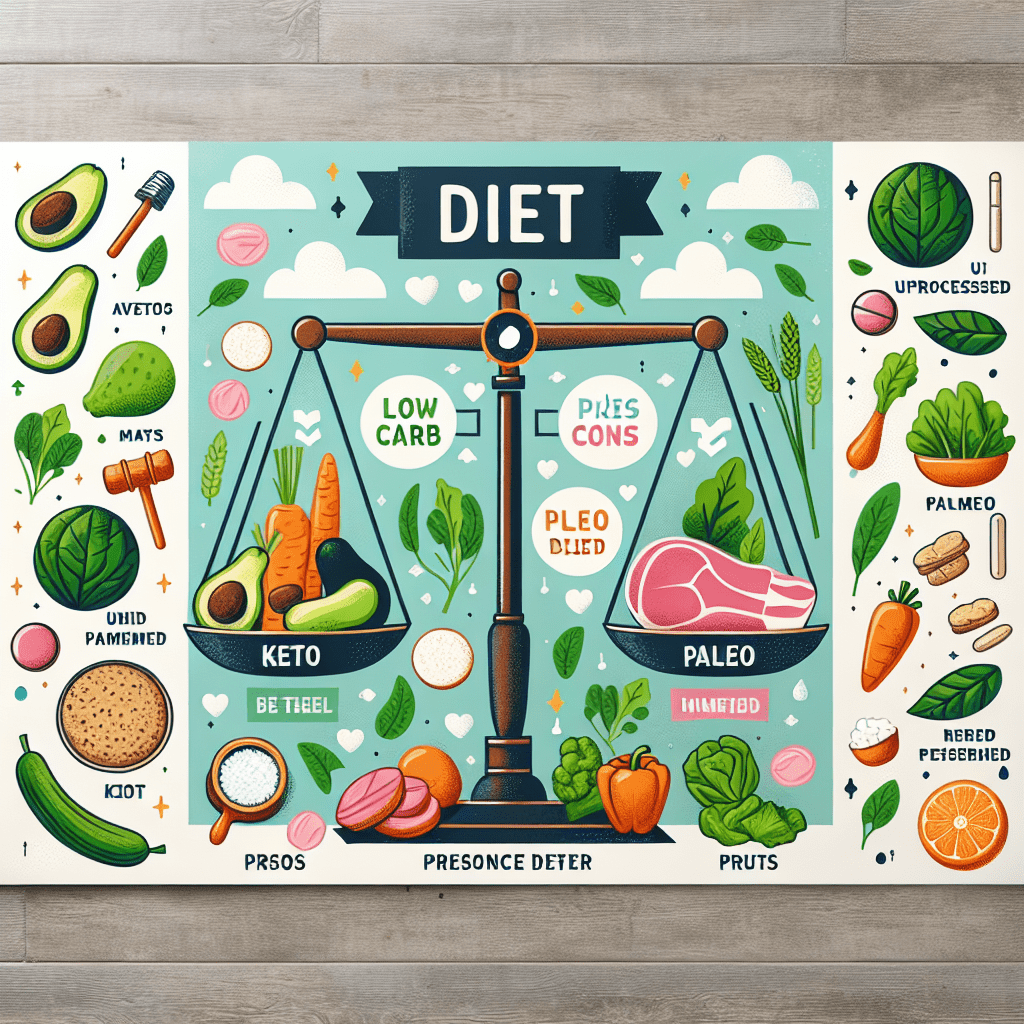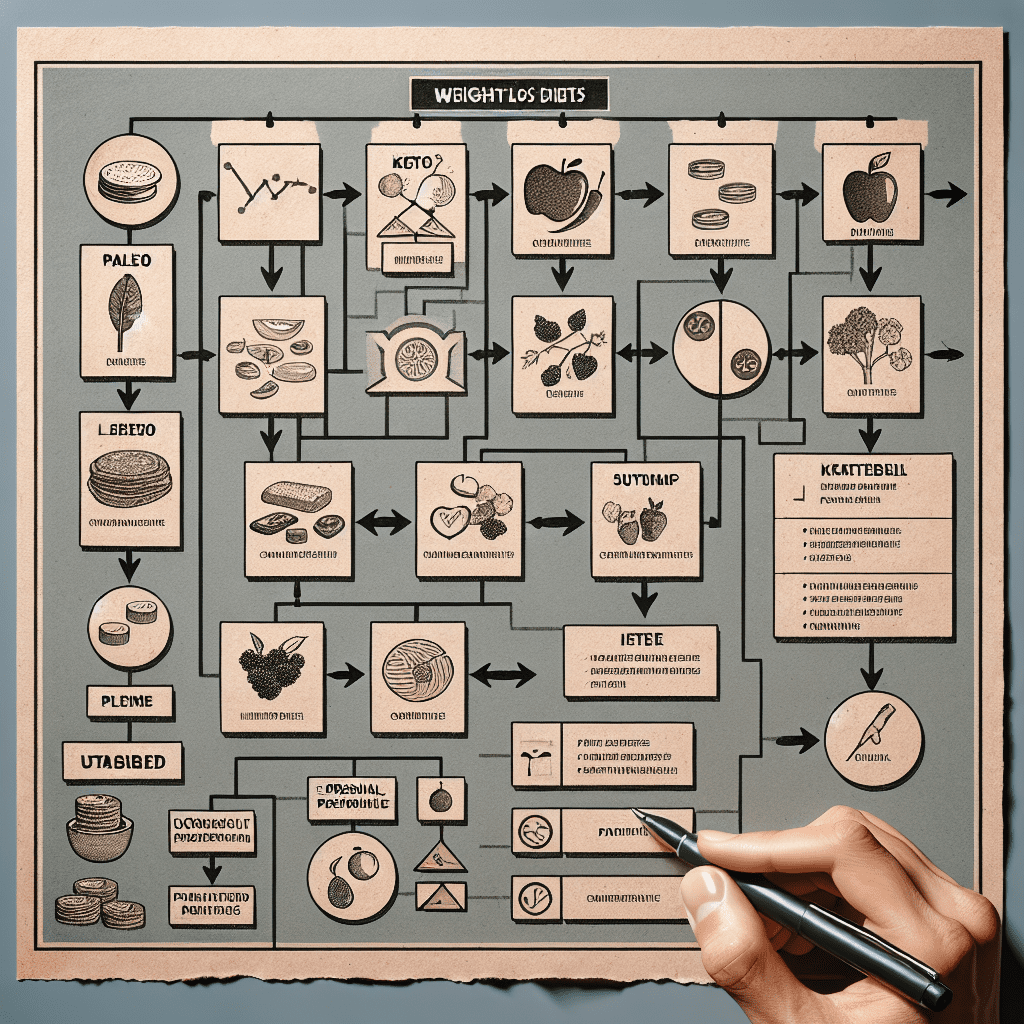Decoding Weight Loss Diets: Finding Your Ideal Nutrition Plan. Are you tired of trying different weight loss diets only to be left feeling confused and overwhelmed? Look no further, because we’ve got you covered! In this article, we will guide you through the maze of weight loss diets, helping you understand the principles behind each one and ultimately finding the ideal nutrition plan for your specific needs. Say goodbye to the frustration and hello to a healthier, happier you! Let’s get started on decoding weight loss diets and finding your perfect fit.
Understanding Weight Loss Diets
When embarking on a weight loss journey, it’s crucial to understand the different types of weight loss diets available. Each diet has its own set of principles and guidelines, and choosing the right one can greatly impact your success.
Different Types of Weight Loss Diets
There are numerous weight loss diets that have gained popularity over the years. Some of the most common ones include the Ketogenic Diet, Intermittent Fasting, Paleo Diet, Mediterranean Diet, and Vegan/Vegetarian Diet. Each diet focuses on different macronutrient ratios and food choices, and it’s important to familiarize yourself with the principles of each diet before making a decision.
What to Consider Before Choosing a Weight Loss Diet
Before deciding on a weight loss diet, there are a few important factors to consider. First and foremost, you need to take into account your personal goals and preferences. Do you want a diet that allows flexibility or one that is more structured? Additionally, you should consider any medical conditions or dietary restrictions you may have. It’s always a good idea to consult with a healthcare professional or registered dietitian to ensure that the diet you choose aligns with your specific needs and goals.
Common Misconceptions About Weight Loss Diets
One common misconception about weight loss diets is that they are a one-size-fits-all solution. In reality, what works for one person may not work for another. It’s important to remember that everyone’s body is different, and what works for one individual may not yield the same results for you. Another misconception is that all weight loss diets are restrictive and unsustainable. While some diets may have strict guidelines, there are plenty of options available that prioritize flexibility and long-term sustainability.
Identifying Your Weight Loss Goals
To set yourself up for success, it’s important to identify your weight loss goals from the start. This will help you stay motivated and focused throughout your journey.
Setting Realistic and Attainable Goals
When setting weight loss goals, it’s important to be realistic and avoid setting unrealistic expectations. Rapid and drastic weight loss may not be sustainable or healthy in the long run. Instead, focus on setting goals that are attainable and healthy for your body. This could include aiming for a gradual weight loss of 1-2 pounds per week.
Determining Your Caloric Needs
Understanding your caloric needs is a crucial step in designing a weight loss diet that works for you. There are various online calculators and tools available that can help you estimate your daily calorie needs based on factors such as your age, gender, weight, and activity level. Keep in mind that creating a calorie deficit is often necessary for weight loss, but it’s important to do so in a healthy and sustainable way.
Considering Personal Preferences
When choosing a weight loss diet, it’s essential to consider your personal preferences and lifestyle. If a particular diet feels restrictive or unrealistic for you, it may not be the best fit. Instead, opt for a diet that includes foods you enjoy and can see yourself sticking to long-term. This will increase the likelihood of success and make the weight loss journey more enjoyable.

The Role of Macronutrients in Weight Loss
Macronutrients, including protein, carbohydrates, and fats, play a vital role in weight loss. Understanding how these nutrients impact your body can help you make informed dietary choices.
Importance of Protein in Weight Loss
Protein is often referred to as the building block of the body, and it plays a crucial role in weight loss. Including an adequate amount of protein in your diet can help curb hunger, increase feelings of fullness, and support muscle growth and repair. Good sources of protein include lean meats, poultry, fish, eggs, dairy products, legumes, and plant-based protein sources such as tofu and tempeh.
The Role of Carbohydrates in Weight Loss
Carbohydrates often get a bad reputation when it comes to weight loss. However, not all carbs are created equal. While it’s important to limit refined carbohydrates and sugar, complex carbohydrates such as whole grains, fruits, and vegetables provide essential nutrients and fiber that can aid in weight loss. These foods are typically lower in calories and can help you feel satisfied while providing sustained energy throughout the day.
The Impact of Healthy Fats on Weight Loss
Contrary to popular belief, not all fats are bad for you. Including healthy fats in your diet is essential for overall health and can actually support weight loss. Healthy fats, such as those found in avocados, nuts, seeds, fatty fish, and olive oil, provide essential fatty acids and help keep you feeling satisfied. They also aid in the absorption of fat-soluble vitamins and provide long-lasting energy, making them an important part of a balanced weight loss diet.
Exploring Popular Weight Loss Diets
With so many weight loss diets to choose from, it’s important to explore some of the most popular options and understand their principles and potential benefits.
Ketogenic Diet
The ketogenic diet, or keto diet for short, is a low-carb, high-fat diet that aims to shift the body into a state of ketosis. In this state, the body burns fat for fuel instead of carbohydrates. The diet typically involves limiting carbohydrate intake to less than 50 grams per day and increasing fat consumption. While the keto diet has shown success in weight loss for some individuals, it may not be suitable for everyone and may require careful monitoring of nutrient intake.
Intermittent Fasting
Intermittent fasting is a dietary approach that involves cycling between periods of fasting and eating. There are different variations of intermittent fasting, but the most common ones include the 16/8 method (fast for 16 hours and eat within an 8-hour window) and the 5:2 diet (eat regularly for five days and restrict calorie intake for two days). Intermittent fasting can be effective for weight loss as it helps regulate insulin levels and can lead to reduced calorie intake. However, it may not be suitable for individuals with certain medical conditions or those prone to disordered eating patterns.
Paleo Diet
The paleo diet, also known as the caveman diet, focuses on eating whole, unprocessed foods that mimic the diets of our ancestors. The diet typically includes lean meats, fish, fruits, vegetables, nuts, and seeds while excluding grains, legumes, dairy, and processed foods. Some studies have shown that the paleo diet can lead to weight loss and improved overall health, but it may be challenging to sustain long-term and requires careful attention to nutrient balance.
Mediterranean Diet
The Mediterranean diet is inspired by the eating habits of countries bordering the Mediterranean Sea and emphasizes whole foods such as fruits, vegetables, whole grains, legumes, fish, and olive oil. This diet is rich in healthy fats, fiber, and antioxidants, and has been linked to numerous health benefits, including weight loss, improved heart health, and reduced risk of chronic diseases. The Mediterranean diet is known for its flexibility and variety, making it a popular and sustainable option for many individuals.
Vegan/Vegetarian Diet
A vegan or vegetarian diet eliminates animal products and focuses primarily on plant-based foods. These diets are typically rich in fruits, vegetables, whole grains, legumes, and plant-based protein sources such as tofu and tempeh. Vegan and vegetarian diets can be effective for weight loss when properly balanced, as they tend to be lower in calories and saturated fats. However, individuals following these diets should pay close attention to their nutrient intake, particularly iron, vitamin B12, and omega-3 fatty acids.
Evaluating the Effectiveness of Weight Loss Diets
When considering a weight loss diet, it’s important to evaluate its effectiveness based on research, scientific evidence, and long-term sustainability.
Research and Scientific Evidence
Before committing to a specific weight loss diet, it’s essential to review the available research and scientific evidence supporting its effectiveness. Look for studies conducted on a diverse range of individuals and assess the duration and outcomes of the studies. Keep in mind that individual results may vary, but scientific evidence can provide valuable insights into the potential benefits and drawbacks of a particular diet.
Long-term Sustainability
A crucial aspect of any weight loss diet is its long-term sustainability. While many diets may yield short-term weight loss results, it’s important to consider whether the diet can be maintained in the long run. Sustainability is key for preventing weight regain and establishing a healthy and balanced relationship with food. Look for a diet that aligns with your values, preferences, and lifestyle, ensuring that it is something you can commit to for the long haul.
Consideration of Individual Differences
Each person’s weight loss journey is unique, and what works for one individual may not work for another. Consider your specific needs, preferences, and lifestyle when evaluating the effectiveness of a weight loss diet. Everyone’s body is different, and it’s important to find an approach that suits your individual circumstances. Consult with a registered dietitian or healthcare professional who can provide personalized guidance and support throughout your weight loss journey.
Addressing Potential Side Effects and Risks
While weight loss diets can be effective, it’s important to be aware of potential side effects and risks that may arise.
Nutrient Deficiencies and Supplementation
Restrictive diets or those that eliminate certain food groups may increase the risk of nutrient deficiencies. It’s important to ensure that your chosen diet provides all essential nutrients and consider incorporating appropriate supplementation if needed. Work with a healthcare professional or registered dietitian to identify any potential deficiencies and develop a plan to address them.
Risk of Muscle Loss
Some weight loss diets may result in the loss of muscle mass along with fat loss. This can have a negative impact on overall body composition and metabolism. To mitigate the risk of muscle loss, ensure that your diet includes an adequate amount of protein to support muscle growth and repair. Strength training exercises can also help preserve muscle mass while promoting fat loss.
Psychological Impact of Restrictive Diets
Restrictive diets can take a toll on mental and emotional well-being. Constantly feeling deprived or restricted may lead to feelings of frustration, guilt, and even disordered eating patterns. It’s important to prioritize your mental health and well-being throughout your weight loss journey. If you find that a particular diet is negatively impacting your relationship with food or your overall happiness, consider seeking support from a mental health professional or registered dietitian.

Factors to Consider When Choosing a Weight Loss Diet
When choosing a weight loss diet, there are several factors to consider to ensure that it fits well with your lifestyle and goals.
Lifestyle Factors
Consider your daily routine, work schedule, and other lifestyle factors when selecting a weight loss diet. If you have a busy schedule or limited access to kitchen facilities, a diet that requires complex meal preparation may not be feasible. Opt for a diet that aligns with your lifestyle and allows for flexibility.
Time and Convenience
Weight loss diets can often require additional time and effort for planning and preparation. Consider the time commitment associated with a particular diet and whether it fits well into your schedule. Additionally, think about the accessibility of foods required by the diet. Are they readily available in your local grocery stores? Will you need to make special trips or order specific ingredients online?
Budget and Accessibility
It’s important to evaluate the financial implications of a weight loss diet. Some diets may require purchasing specific ingredients or specialty food items that can be costly. Consider your budget and ensure that the diet you choose is sustainable from a financial standpoint. Additionally, assess the accessibility of the required foods in your area. If certain foods are not readily available, it may be challenging to consistently follow the diet.
Developing a Personalized Nutrition Plan
To achieve successful weight loss, it’s crucial to develop a personalized nutrition plan tailored to your specific needs and goals.
Consulting with a Registered Dietitian
Working with a registered dietitian is invaluable when creating a personalized nutrition plan. A dietitian can take into account your individual needs, goals, and lifestyle factors to develop a plan that is both effective and realistic. They will provide guidance on nutrient intake, portion sizes, and help you navigate any dietary restrictions or considerations.
Balancing Macronutrient Ratios
When developing your nutrition plan, it’s important to strike a balance between macronutrients – protein, carbohydrates, and fats. The ideal macronutrient ratios can vary based on individual factors such as activity level, body composition, and personal preferences. A registered dietitian can help determine the appropriate macronutrient ratios to support your weight loss goals and overall health.
Incorporating Exercise and Physical Activity
While diet plays a significant role in weight loss, incorporating regular exercise and physical activity is equally important. Aim for a combination of cardiovascular exercise, strength training, and flexibility exercises to promote overall health and support your weight loss efforts. Consult with a healthcare professional or certified personal trainer to create an exercise plan that complements your nutrition plan.

Tips for Successful Weight Loss
In addition to following a weight loss diet and personalized nutrition plan, there are some practical tips that can contribute to successful weight loss.
Meal Planning and Preparation
Meal planning and preparation can help you stay on track and make healthier choices throughout the day. Set aside time each week to plan your meals and prepare healthy snacks in advance. This will help you avoid impulsive food choices and ensure that you have nutritious options readily available.
Monitoring Portion Sizes
Monitoring portion sizes is crucial when it comes to weight loss. It’s easy to underestimate the amount of food we consume, leading to unintentional calorie excess. Invest in measuring cups, a food scale, or utilize portion control containers to accurately gauge serving sizes. Tracking your food intake using a food diary or mobile app can also help keep you accountable and aware of portion sizes.
Tracking Progress and Adjustments
Tracking your progress is an effective way to stay motivated and make adjustments as needed. Keep track of your weight, body measurements, and overall progress in a journal or using a mobile app. Be mindful that weight loss is not always linear and may vary from week to week. Instead of solely relying on the scale, focus on other indicators of progress such as changes in energy levels, sleep quality, and overall well-being.

Conclusion Decoding Weight Loss Diets: Finding Your Ideal Nutrition Plan
Decoding weight loss diets and finding your ideal nutrition plan can feel overwhelming, but with the right knowledge and guidance, it is completely achievable. Consider your personal goals, preferences, and lifestyle factors when choosing a weight loss diet. Remember to consult with a healthcare professional or registered dietitian for personalized guidance. Focus on setting realistic and attainable goals, understanding the role of macronutrients, and evaluating the effectiveness and potential risks of different diets. With a personalized nutrition plan, a healthy mindset, and consistent effort, you can embark on a successful weight loss journey and achieve the results you desire.